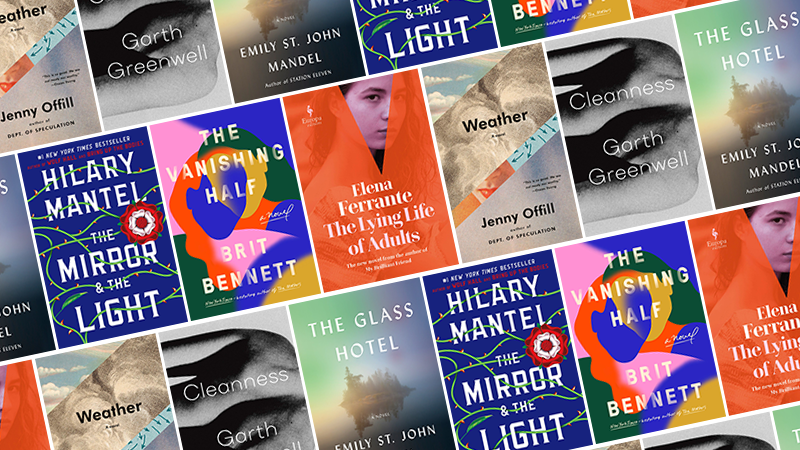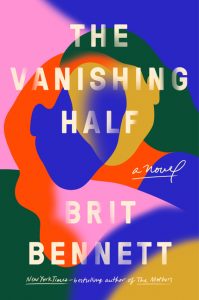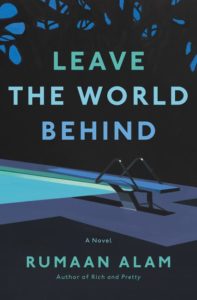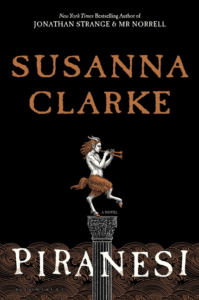
2020—the longest year that has ever been—is almost at an end, and that means it’s time for us to break out the calculators and tabulate the best reviewed books of past twelve months.
Yes, using reviews drawn from more than 150 publications, over the next two weeks we’ll be revealing the most critically-acclaimed books of 2020, in the categories of (deep breath): Memoir & Biography; Sci-Fi, Fantasy, and Horror; Short Story Collections; Essay Collections; Graphic Literature; Poetry; Mystery & Crime; Literature in Translation; General Fiction; and General Nonfiction.
Today’s installment: Fiction.
1. Weather by Jenny Offill
(Knopf)
36 Rave • 24 Positive • 2 Mixed
Read an interview with Jenny Offill here
“… tiny in size and immense in scope, radically disorienting yet reassuringly humane, strikingly eccentric and completely irresistible … A narrator and a novel that hum with anxiety and pulse with dread are nonetheless hilarious, warm, and lovable. Both ruefully mordant and strangely consoling, Weather is at once brutal in its unsparing honesty and utterly exhilarating in its wit and intelligence. It radiates with the beleaguered yet buoyant optimism, the luminous integrity, of a supple and fearless writer.”
–Pricilla Gilman (The Boston Globe)
2. Cleanness by Garth Greenwell
(FSG)
38 Rave • 11 Positive • 3 Mixed • 1 Pan
Listen to Garth Greenwell read from Cleanness here
“… incandescent … Anyone who read Greenwell’s first novel, What Belongs to You (2016), knows that his writing about sex is altogether scorching. You pick his novels up with asbestos mitts, and set them down upon trivets to protect your table from heat damage … There’s a moral quality to these extended sessions. In bed is where Greenwell’s men work out and reveal the essences of their personalities … Carnal moments are accelerants; they’re where Greenwell’s existential and political themes are underlined, then set ablaze … a better, richer, more confident novel. You intuit its seriousness and grace from its first pages. It’s a novel in search of ravishment … Greenwell is a sensitive writer about the student-teacher relationship … Greenwell has an uncanny gift, one that comes along rarely. Every detail in every scene glows with meaning. It’s as if, while other writers offer data, he is providing metadata … This novel’s second half is not quite the equal of its first. Some scenes end rather than resolve. Greenwell is a brooder. You begin to wonder how his humorlessness will wear over time … Yet there are no failures of equilibrium. This writer’s sentences are so dazzlingly fresh that it as if he has thrown his cape in the street in front of each one. Greenwell offers restraint in service of release. He catches you up so effortlessly that you feel you are in the hands of one of those animals that anesthetizes you before devouring you.”
–Dwight Garner (The New York Times)
3. The Glass Hotel by Emily St. John Mandel
(Knopf)
29 Rave • 22 Positive • 6 Mixed
Watch an interview with Emily St. John Mandel here
“… a novel that’s so absorbing, so fully realized that it draws you out of your own constricted situation and expands your sense of possibilities. For me, over the past 10 days or so, the novel that’s performed that act of deliverance has been The Glass Hotel … gorgeous and haunting … This all-encompassing awareness of the mutability of life grows more pronounced as The Glass Hotel reaches its eerie sea change of an ending. In dramatizing so ingeniously how precarious and changeable everything is, Mandel’s novel is topical in a way she couldn’t have foreseen when she was writing it.”
–Maureen Corrigan (NPR)
4. The Mirror & the Light by Hilary Mantel
(Henry Holt)
33 Rave • 12 Positive • 7 Mixed • 1 Pan
“…magnificent … The portrait of Thomas Cromwell…now concludes with a novel of epic proportions, every bit as thrilling, propulsive, darkly comic and stupendously intelligent as its predecessors … orking with and against our foreknowledge, Mantel keeps us on the brink, each day to be invented … The Mirror & the Light is generously self-sufficient—to read this alone would hardly be skimping: it is four or five books in itself. But it also continues, deepens, and revises its forebears, negotiating with its past as does Cromwell with his … [Mantel] is still exuberantly rethinking what novels can do. Not since Bleak House has the present tense performed such magic. The narrative voice rides at times like a spirit or angel on thermals of vitality, catching the turning seasons, the rhythms of work and dreams, cities and kitchens and heartbeats … Endings, insists Cromwell, are opportunities. What begins now is the rereading. For this is a masterpiece that will keep yielding its riches, changing as its readers change, going forward with us into the future.”
–Alexandra Harris (The Guardian)

5. The Vanishing Half by Brit Bennett
(Riverhead)
25 Rave • 12 Positive • 1 Mixed
Read an interview with Brit Bennett here
“The Vanishing Half…belongs to a long tradition of literature about racial passing … Bennett roots out these withered tropes and reanimates them in a fresh, surprising story … she leans into their prescribed melodrama. Her omniscient narration roves among story lines, introducing us to a cast of stock characters … More than once, the plot turns on an outrageous coincidence. But, as the novel unfolds, we begin to recognize how deftly Bennett is rearranging the generic pieces of her story. Her frictionless prose whisks us across a period of nearly forty years, the plot unwinding nonsequentially … The electricity inside this space—past, present, and the stretch between—comes from watching seemingly predictable characters collide in unexpected ways … The narrative of passing inevitably confronts questions of performance: the dissonance between the authentic self and the projected self, the drama of seeing and being seen. But, in Bennett’s novel, Stella, the archetypal passing figure, is hardly the only performer. All of Bennett’s characters wrestle with the roles they have been assigned. The vital dynamic between actor and spectator yields different models of selfhood.”
–Sarah Resnick (The New Yorker)

6. The Lying Life of Adults by Elena Ferrante
(Europa Editions)
21 Rave • 21 Positive • 4 Mixed • 2 Pan
“… exquisitely moody … Life of Adults itself…invites us to evaluate lying not only as a moral problem, but also as an aesthetic challenge—to ask whether a lie can ever be elevated into an art form … It is a novel of disillusionment, as the literary critic Georg Lukács once described the category: a novel that strips away its young protagonist’s major social relationships to elevate her interiority … this marvelously disconcerting novel of disillusionment is a product of the grace extended to the liar by the writer. Only the writer’s truthful lies can mirror the liar’s petty ones with the clear sight needed to affirm the intensity of her past. Only the writer knows how to conjure desire; sympathize with misjudgment; rebuke carelessness; disappoint mercifully. Always, Ferrante’s fiction reminds us that sometimes you need someone else to help gather the scattered fragments of your existence.”
–Merve Emre (The Atlantic)

7. Leave the World Behind by Rumaan Alam
(Ecco)
26 Rave • 6 Positive • 5 Mixed
Listen to an excerpt from Leave the World Behind here
“… a zingy dystopian exercise whose blooming absurdities (the less about which you know going in, the better) would seem frankly unbelievable if they didn’t ring so true … Alam has both a golden ear and a gimlet eye for the Sturm und Drang of the city’s ever-shifting social’s strata; a way of slyly dinging its self-delusions and virtue-signalling without turning cruel or petty … Unsurprisingly, the book’s rights have already been snapped up by Netflix…The plan is to present it as a feature film, though the full length of a limited series might better serve the busy tangle of ideas on race and class and consumerism and 21st-century malaise contained within Alam’s wild World; until then, his bright, audacious words will have to do.”
–Leah Greenblatt (Entertainment Weekly)

8. Piranesi by Susanna Clarke
(Bloomsbury)
26 Rave • 6 Positive
“We believers have waited a long time for a second novel from Clarke, and so it’s especially exciting to see that none of her enchantment has worn off—it’s evolved. Reading her lithe new book, Piranesi, feels like finding a copy of Steven Millhauser’s Martin Dressler in the back of C.S. Lewis’s wardrobe … The hypnotic quality of Piranesi stems largely from how majestically Clarke conjures up this surreal House … an unusually fragile mystery—as delicate as the slender fingers and wispy petals on the marble statues that fill the House. Clarke’s power certainly extends beyond mere suspense, but her story relies on the steady accretion of apprehension that finally gives way to a base-shifting revelation. Until you read the book yourself, keep your wand drawn to ward off the summaries of enthusiastic fans and clumsy reviewers. I promise to tread carefully here … Perhaps Clarke’s cleverest move in this infinitely clever novel is the way she critiques our obliterating efforts to extract deeper meaning and greater value from everything in our world … This is the abiding magic of Clarke’s novel: We’re as likely to pity Piranesi for his cheerful acceptance of imprisonment as we are to envy him for his ready appreciation of the world as he finds it. Clarke conceived of this story long before the coronavirus pandemic, but tragedy has made Piranesi resonate with a planet in quarantine. To abide in these pages is to find oneself happily detained in awe.”
–Ron Charles (The Washington Post)
9. Transcendent Kingdom by Yaa Gyasi
(Knopf)
27 Rave • 4 Positive
Listen to Yaa Gyasi read from Transcendent Kingdom here
“Ms. Gyasi has trained her ambitions inward, applying the same rigorous attention to the quality of her sentences and to the laser-like interrogation of her themes. She has produced a powerful, wholly unsentimental novel about family love, loss, belonging and belief that is more focused but just as daring as its predecessor, and to my mind even more successful … The narrative of difficult, immigrant striving is derailed by a slow-motion tragedy … Unlike many novels centered on suffering, Ms. Gyasi’s book is not interested in eliciting sympathy or activating the reader’s guilt. It is, instead, burningly dedicated to the question of meaning … confidently shuttles between the poles of faith and science—it quotes the Bible as fluently as it discusses neural circuits in the medial prefrontal cortex—plumbing each for comforts and insights but also dispassionately studying the ways that each falls short … a hard, beautiful, diamantine luster.”
–Sam Sacks (The Wall Street Journal)
10. A Burning by Megha Majumdar
(Knopf)
26 Rave • 5 Positive • 2 Mixed
Read an excerpt from A Burning here
“…[a] propulsive debut novel … a baldly, horrifyingly plausible premise … The narration swivels from the perspective of one character to the next, each of whom, by dint of status or sensibility, knows something the others cannot … Lovely is the guerrilla unit, the novel’s most exuberant creation … The texture of the novel—its amplitude, tenderness, commotion—comes to us from her curiosity and habit of attentiveness … This is a book to relish for its details, for the caress of the writer’s gaze against the world, the way it dawdles over all that might be considered coarse or inconsequential … Majumdar’s descriptions of life, of stench and bodies, of stifled ambitions and stoked resentments, feel instructive, a rejoinder to the ways reality is so commonly distorted … Majumdar writes with a lanky, easy authority; the narrative stride is broken only by rare missteps … What we describe helplessly as our fate is, very often, other people’s choices acting upon us—choices that remain largely unknown or, at best, dimly perceived. The novel flays open these mysteries … The interplay of choice and circumstance has always been the playing field of great fiction, and on this terrain, a powerful new writer stakes her claim.”
–Parul Sehgal (The New York Times)
*
Our System: RAVE = 5 points • POSITIVE = 3 points • MIXED = 1 point • PAN = -5 points

